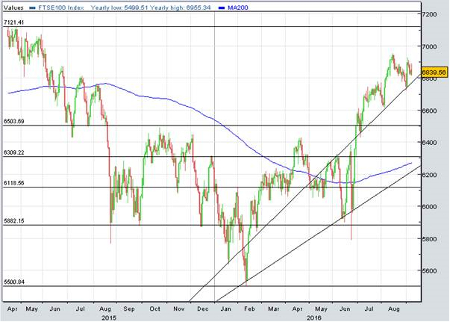Can FTSE 100 biggies justify record highs?
8th September 2016 15:59
by Lee Wild from interactive investor
Share on
It's happy days for UK investors. The FTSE 100 is up 25% since the dark days of February and sits just 71 points from a 15-month high, or less than 300 from an all-time best. Did Brexit really happen?
Astonishingly, 23 companies made a new record high today. This week it's over 50. Since Brexit, it's 157! Yes, that includes a generous helping of investment trusts, but some of the biggest names are in there, too.
Martin Sorrell's has swelled his personal fortune to gazzillions, five-year uptrend remains firmly intact and there's been an unprecedented scramble into defensive overseas earners , and .
Housebuilders are certainly trading like Brexit never happened. just churned out another set of record results, and tells us housing completions hit an eight-month high in the year to June. Average selling prices rose over 10%. Current trading trends, meanwhile, are "positive".
Fleeing the market after the referendum, and staying out, would have been a huge financial mistake.
So, Brexiteers can afford a chuckle at Remainers. Nothing to worry about, see. OK, they have a point, but the referendum has not resolved the uncertainty. What it has done is plunge sterling to its lowest against the dollar since the mid-1980s, when there was still a Cold War and Simple Minds' Don't you (forget about me) topped the charts.
A weak pound has been a huge boon to the thousands of British companies generating income in overseas currencies, and foreign investors are clearly attracted by cheap assets here. But the post-Brexit glory days cannot last indefinitely. Currency devaluation is not a tool to use every time the chips are down. That said, neither was quantitative easing (QE).

Record low interest rates also make equities the only show in town. They have been for years, but returns on these bond proxies still eclipse anything you get elsewhere.
And a key reason Brexit hasn't had a massive impact on the domestic economy yet is because it hasn't happened. All the electorate has said is we'd like it to happen. It may not, you know. Businesses are not going to put investment decisions on hold forever, and money is being spent. Certainly, PM Theresa May is giving away nothing and everything. "Brexit means Brexit," we're told, but she quickly clams up when the hard questions get asked.
Down the road
Given the current post-referendum "phoney war", a period during which economic data has been OK, and financial markets have enjoyed one of their strongest bull runs in history, might May be tempted to keep kicking Article 50 down the road deeper into 2017?
She might. And serious concerns about the state of the economy will probably trigger further central bank intervention. The Bank of England will probably further prop up the UK economy with extra stimulus over the next few months, especially since the think tank National Institute of Economic and Social Research (NIESR) currently puts the odds of a UK recession next year at 50:50.
On the continent, European Central Bank (ECB) president Mario Draghi may have stopped short of extending QE for a further 9-12 months at today's policy meeting, but the Eurozone economy is hardly shooting the lights out, so expect the printing presses to keep rolling past next March.
And, with so-called "macro surprises" (weak economic data to you and I) on the increase, cyclical stocks are at risk. As Dr Sebastian Raedler, head of European equity strategy at Deutsche Bank, warns today, European cyclicals have outperformed defensives by 13% since late June, the sharpest rally in cyclicals since 2010.
"When global macro surprises have rolled over in the past, cyclicals have typically underperformed defensives by around 9% over three months," he says. It's why a bunch of cyclical names that have outperformed since Brexit, including and , are now rated a 'sell' by the broker.
Interestingly, those three defensive names mentioned above - Unilever, BATS and Reckitt - have underperformed since 27 June and, according to Deutsche, are a 'buy'. You know these are crazy times when price/earnings (PE) multiples of around 20 represent 'value'.
We'll see.
This article is for information and discussion purposes only and does not form a recommendation to invest or otherwise. The value of an investment may fall. The investments referred to in this article may not be suitable for all investors, and if in doubt, an investor should seek advice from a qualified investment adviser.